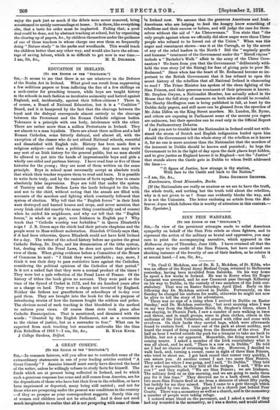A GREAT COMEDY.
[TO THE EDITOR Or THE " SPECTATOR:1
Sra,—In common fairness, will you allow me to contradict some of the extraordinary statements in one of your leading articles entitled " A Great Comedy" ? Ananias himself must surely have directed the hand of the writer, unless he willingly refuses to study facts for himself. The funds which are at present being collected in Ireland, and to which such a generous response has come and still comes from America, are for the dependants of those who have lost their lives in the rebellion, or have been imprisoned or deported, many being still untried ; and not for those who are prospering under the present war conditions in the country —if they so prosper as your correspondent suggests. Surely this cry of women and children need not bo attacked. And it does not need much imagination to realize that all is not prospering with some of these in Ireland now. We assume that the generous Americans and Irish. Americans who are helping to feed the hungry know something of rebellions and their success or failure, and will judge the case for them- selves without the aid of " An Ulsterwoman." You state that " the only people against whom we officially did show anger were those Ulster people who refused to be forced out of the Union." When was this anger and resentment shown—was it at the Curragh, or by the arrest of any of the rebel leaders in the North ? Did the " supinely gentle and humane " treatment of the Government under the " Birrell regime" include a " Bachelor's Walk " affair in the army of the Ulster Cove- nanters ? We learn from you that the Government "deliberately with- held the true story [of the Rising] for -fear of giving pain to poor Mr. Redmond." Since when has the heart of Mr. Redmond become so im- portant to the British Government that it has refused to open the secret history of the rebellion that all National Ireland is clamouring to read ? The Prime Minister has spoken of the clean fighting of the Sinn Feiners, and their generous treatment of their prisoners is known. Mr. Stephen Gwynn, a Nationalist Member, has actually asked in the House that the full story of massacre on both sides should be revealed. The Sheehy Skeffington case is being published in full, at least by the Dublin daily papers, and still more can be gleaned from the speeches of Mr. John Dillon on the King Street murders. Mr. Landon, Mr. Byrne, and others are exposing in Parliament some of the secrets you regret are unknown, but their speeches can be read only in the Official Report of the Parliamentary Debates.
I ask you not to trouble lest the Nationalist in Ireland could not with- stand the storm of Scotch and English indignation hurled upon him should the Government tell the whole story of the rebellion as it knows it, for no one is more anxious than the Nationalist that the murders of the innocent in Dublin should be known and punished ; he begs the Government to let in the light of day upon the dark places kept hidden, and to give justice as England knows it in England—not the "Justice" that stands above the Castle gate in Dublin to whom Swift addressed the lines :-
" 0 figure of Justice, how strange is thy station,
With face to the Castle and -back to the Nation."
[If the Nationalists are really as anxious as we are to have the truth, the whole truth, and nothing but the truth told about the rebellion, why is it not given to us ? Some one evidently blocks the way, and it is not the Unionists. The letter enclosing an article from the Mel- bourne Argus which follows this is worthy of attention in this context.— ED. Spectator.]






























 Previous page
Previous page